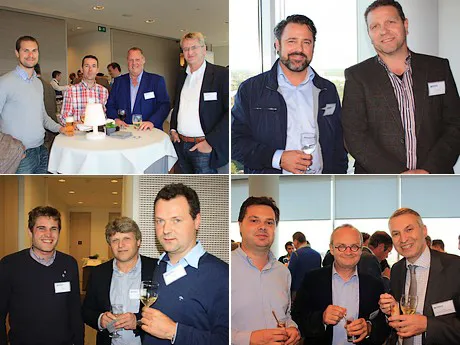Supply Chain Initiative
Romain Cools noted that the chain platform really isn't a sexy theme, but that it's of great importance, and that the fresh produce sector knows this as well, since subjects are also discussed that have to do with this sector, and we are linked to other chains in certain ways. In the general debate, things like the Russia boycott and food & health are also discussed. Behind this initiative are Bemefa, Agrofront, Fevia, Unizo, UCM and Comeos. Together, as Belgian chain platform of the agro-food chain, they took the initiative to formulate a code of conduct, and to subscribe to it to support fair relations between suppliers and buyers. "We try to involve as many sectors and links in the chain as possible," Romain explained.

After the presentations it was time for a reception. Click here for the photo report
Divergent economic interests
Click here for the photo report
Debate
In the debate, moderated by Romain, various themes were discussed related to the chain platform. He asked the participants why they joined up with it. Nathalie De Greve of Comeos: "We came to the conclusion that it would be good to discuss things with each other. That way, as an agro-food chain, we can come forward with one voice." Marc Rosiers of Boerenbond: "Our members have been confronted with increasing volatility in prices and the price level. Where low prices are concerned, this could have various causes. Commercial campaigns at retailers help to boost demand, but it's sometimes very difficult to make that clear to growers. An agreement has been reached in the chain platform, and where commercial campaigns are concerned, tough circumstances at growers are taken into account. It's very important to explain why they come up with certain promotions." Dirk Decoster (Fevia): "We reluctantly joined the initiative. On the one hand, we want to have good ties with agriculture, because they're our suppliers, but on the other hand we can't be too strongly against distribution, because those are our buyers. We did fully support the idea that talking would have to be done first." Karel Van Eetvelt (Unizo) emphasized his natural aversion to regulation. "It is important for politics to follow these events actively, to keep the pressure on those wanting to play the game. I also get a lot of complaints from entrepreneurs, even in retail (franchisers)." He sees the danger of market concentrations. "Take the Ahold/Delhaize story. When you concentrate the market, the free market is out of play. Politics should stay on their toes with that." Dispute resolution was also discussed. Karel Van Eetvelt: "There is a fear among entrepreneurs to come to the arbitration board. That fear has to do with the market concentration. Entrepreneurs are afraid that the client will take action against them, and that they will lose their buyer. That fear has to disappear. Let the complaints come." From the audience, a question was asked about the the danger of concentrations such as Ahold and Delhaize. Karel: "We see a movement coming up in Europe that looks at those concentrations of power with a lot of suspicion, realizing there are limits. Especially when you start mapping the effect on society. In the retail sector in Belgium, there is definitely still competition, but that's not the case in all European countries. Fortunately you're seeing more and more people resisting that movement, which is a good thing."
Edwin De Boeck, chief economist Corporate KBC, also discussed the business cycle and interest, and answered the question: is the Euro crisis over, or is it yet to begin? We will publish this presentation tomorrow.
